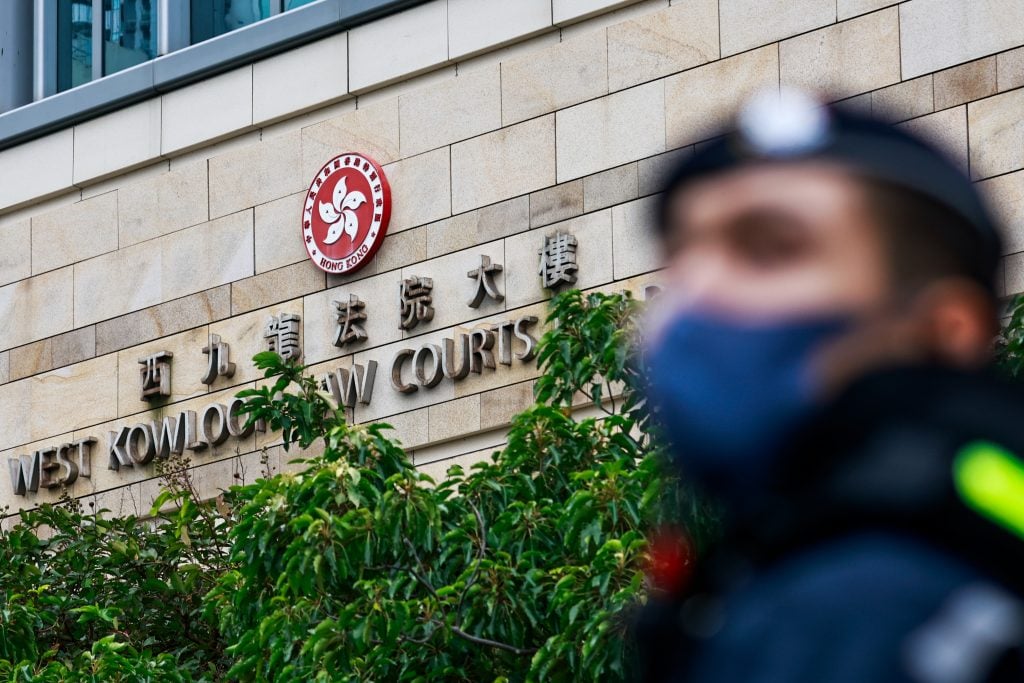Law & Politics
Hong Kong Artist Sentenced to Jail for ‘Subversion’
Clarisse Yeung was among 45 defendants who were convicted over their roles in a pro-democracy political primary in 2020.

Clarisse Yeung was among 45 defendants who were convicted over their roles in a pro-democracy political primary in 2020.

Adam Schrader

A Hong Kong artist has been sentenced to six years in prison on charges of “subversion.” She is one of 45 of Hong Kong’s well-known pro-democracy figures who were sentenced in a mass trial as Beijing’s crackdown on dissent continues.
Clarisse Yeung, 38, is an artist and, previously, an elected member of Hong Kong’s district council. She first rose to prominence during the city’s 2014 pro-democracy protests, during which she helped gather art installations and photographs related to the movement for the Umbrella Movement Visual Archive. The next year, she ran for a district council seat in Wan Chai against a pro-Beijing candidate and won, taking office in January 2016.
In 2019, Hong Kong was again hit with protests against China’s encroachment on its autonomy, which gave pro-democratic candidates like Yeung momentum to clinch their elections amid record voter turnouts. During that election cycle, she became chair of the Wan Chai District Council after helping pro-democratic candidates seize control.
“The people I have dealt with, from government officials to well-educated professionals from the community, they tend to obey the structure,” Yeung told Artnet’s Vivienne Chow after that election win. “If those from above say ‘no,’ they dare not challenge the order. There is a lack of imagination. But coming from a fine art background, I can see things differently.”
Yeung then intended to run in a 2020 Hong Kong Legislative Council election that the government postponed amid the pandemic, a decision seen by pro-democracy candidates as being politically motivated. That year, the Hong Kong government also implemented a national security law that criminalized “separatism, subversion, terrorism and foreign interference.”

Clarisse Yeung lobbying for a defunct bus route to be brought back in 2019.
The artist was among 45 of 47 defendants who were convicted after trial under the national security law for their roles in an unofficial party primary election, organized by legal scholar Benny Tai, for the 2020 citywide legislative election. Prosecutors had alleged that the pro-democracy defendants had hoped to win a legislative majority to paralyze the city’s government.
Yeung was sentenced Tuesday to 78 months in prison after the court granted her a three-month reduction for “her possible mistake as to the lawfulness of the scheme” and another three-month reduction after her father and colleagues wrote letters to the court commending her contributions to cultural policies and charitable works, court records show.
Two defendants were acquitted in a May hearing. The remaining 45—which include other lawmakers, activists, and journalists—received prison sentences ranging from 50 months to 10 years in prison in what has been described as the largest single prosecution to date under the 2020 national security law.
The mass sentencing has been highly criticized by many Western countries, including the United States, which called on authorities in Beijing and Hong Kong to “cease politically motivated prosecutions of Hong Kong citizens and to immediately release all political prisoners and individuals jailed for their peaceful advocacy for rights and freedoms.”
“Certain Western countries blasted Hong Kong’s judiciary today for rightly implementing the national security law. This is unfair, unjust and unacceptable,” a spokesperson for China’s Foreign Ministry said in a statement. “The HK court’s sentencing is a rightful exercise of justice in the interest of national security—a regular practice in those Western countries themselves. Their unfair accusations put a question mark to their seriousness about the rule of law.”
Since Beijing instituted the national security law, many democracy advocates are either in prison or in self-imposed exile for safety. Several civil groups and independent media outlets have also shut down. Beijing also overhauled Hong Kong’s electoral system to ensure only “patriots” can stand for office.